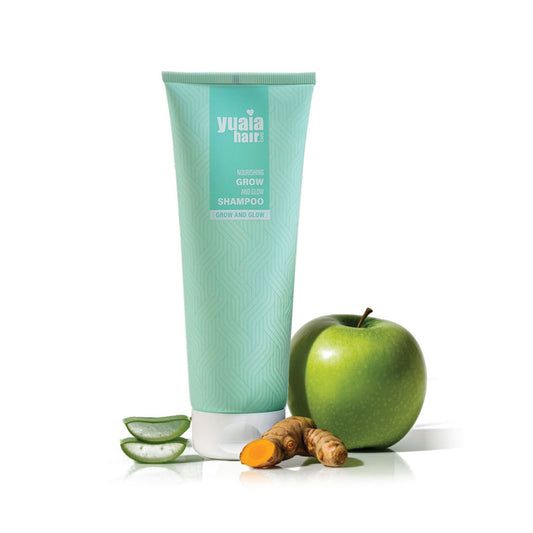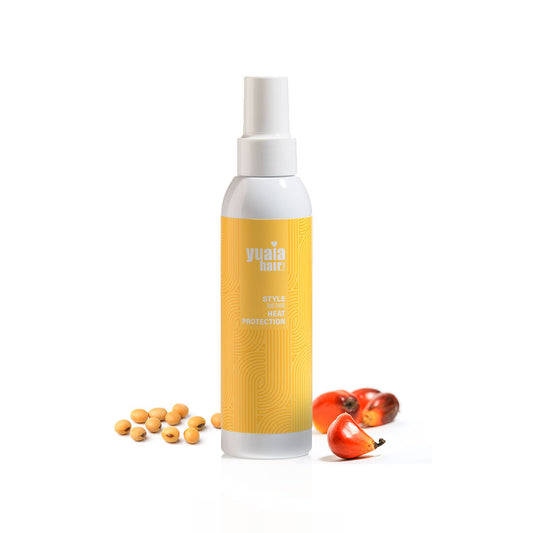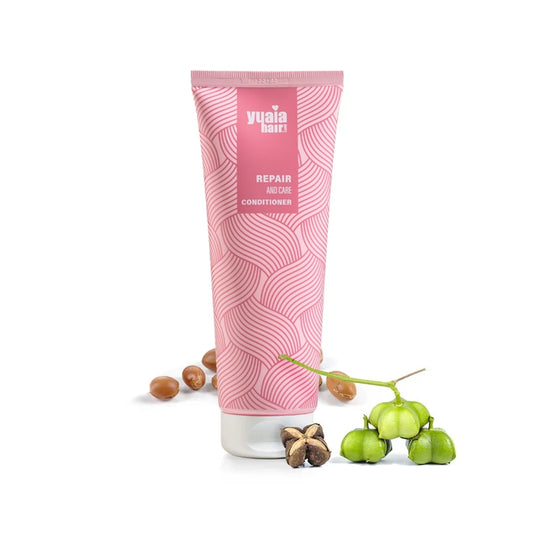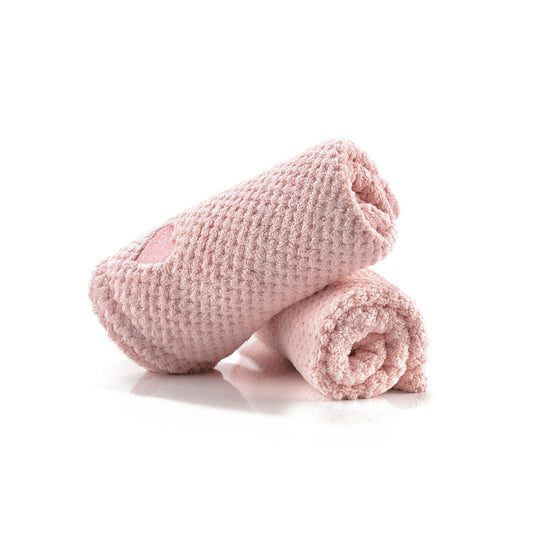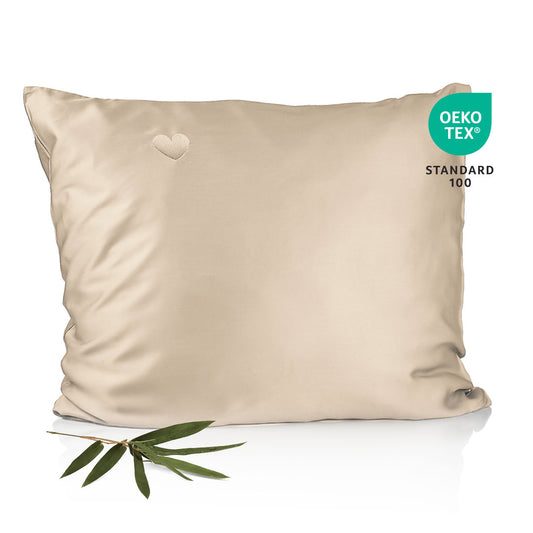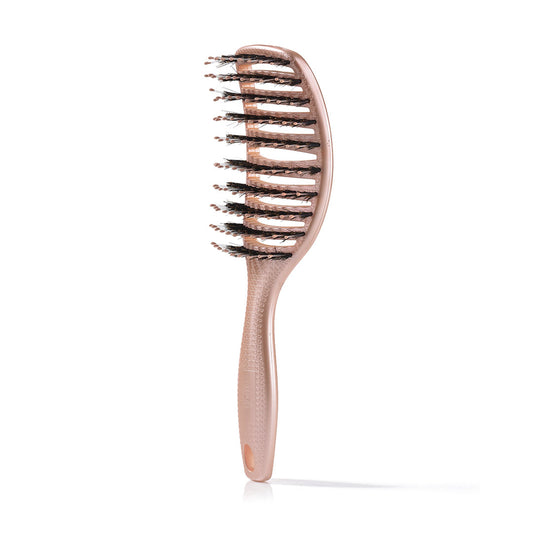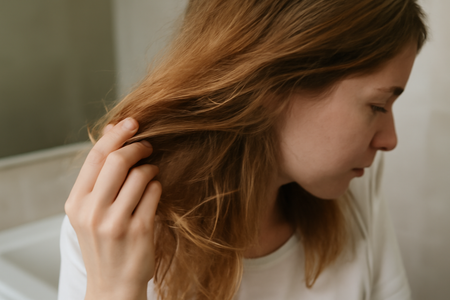
Effective solutions for preventing dry hair
Addressing dry hair effectively requires a combination of targeted treatments and mindful habits. By integrating moisture-enhancing practices into your routine, you can significantly improve your hair's hydration levels and overall health.
Conditioning and moisture treatments
Regular conditioning is essential for maintaining hair moisture. Opt for rich, nourishing conditioners that restore hydration and strengthen hair. Our Repair and Care Conditioner is designed to revitalize dry, damaged, or colored hair, providing the deep nourishment it needs. For an intensive treatment, consider incorporating a weekly hair mask to infuse your hair with extra moisture and nutrients. These treatments help replenish lost moisture and repair damage, leaving your hair smoother and more manageable.
Gentle drying techniques
How you dry your hair can also impact its moisture retention. Instead of rough towel drying, opt for a microfiber towel or a soft cotton t-shirt to gently squeeze out excess water. This reduces friction and prevents breakage. Additionally, consider swapping your regular pillowcase for a bamboo pillowcase. Bamboo fabric is less absorbent than cotton, helping to retain your hair's natural moisture overnight and reducing morning frizz.
Diet and health considerations
While products and techniques play a significant role, it's essential to remember that overall health can influence hair condition. A healthy diet supports hair health, so ensure you're consuming a balanced mix of nutrients. If you suspect underlying health issues might be contributing to your hair's dryness, consulting with a healthcare professional can provide further insights.
Daily haircare routines to retain moisture
Establishing a daily routine that prioritizes moisture retention can make a noticeable difference in your hair's texture and appearance. Here are some practical tips to incorporate into your regimen:
Adapting haircare practices
Adjust the frequency of your hair washing to avoid stripping away natural oils. Between washes, apply hydrating serums or creams to the ends of your hair to lock in moisture. This is especially important if you have longer hair that tends to dry out at the tips.
Brushing and detangling
Using the right brush can prevent unnecessary breakage and help distribute natural oils from the scalp along the length of the hair. Our Curvy Brush is ideal for gentle detangling and smoothing, ensuring your hair remains healthy and tangle-free.
By integrating these solutions into your haircare routine, you can effectively combat dryness and maintain hydrated, healthy hair.
Additional insights into dry hair
While understanding the main causes and solutions for dry hair is essential, there are additional insights that can further enhance your hair care routine. These tips can help you maintain moisture and prevent your hair from drying out too quickly.
Understanding hair porosity
Hair porosity refers to your hair's ability to absorb and retain moisture. Low porosity hair has tightly bound cuticles, making it difficult for moisture to penetrate. High porosity hair, often damaged or chemically treated, absorbs moisture quickly but may struggle to retain it. Understanding your hair's porosity can help you choose the right products and techniques to maintain optimal moisture levels.
Impact of water temperature
The temperature of the water you use to wash your hair can significantly affect its moisture balance. Hot water can strip your hair of natural oils, leading to dryness. Opt for lukewarm water to cleanse your hair, and finish with a cool rinse to help seal the cuticles and lock in moisture.
Role of protective hairstyles
Protective hairstyles, such as braids, twists, or buns, can help shield your hair from environmental stressors and reduce moisture loss. These styles minimize manipulation and friction, allowing your hair to retain its natural oils and remain hydrated.
Frequently asked questions
Why does my hair feel dry even after conditioning?
There are several reasons why your hair might feel dry after conditioning. Product buildup can prevent the conditioner from penetrating the hair shaft effectively. Using a clarifying shampoo occasionally can help remove buildup and improve the effectiveness of your conditioning treatments.
Can sleep habits affect hair moisture?
Yes, sleep habits can impact hair moisture. Sleeping on absorbent materials, such as cotton pillowcases, can draw out moisture from your hair overnight. Switching to a bamboo pillowcase can help retain moisture and reduce dryness.
How does air drying affect hair moisture?
Air drying is generally gentler on your hair compared to heat styling. However, leaving your hair wet for extended periods can lead to moisture loss as water evaporates. To minimize this, gently pat your hair dry with a microfiber towel to remove excess water before letting it air dry.
By understanding these additional factors and incorporating them into your routine, you can further enhance your hair's moisture retention and overall health.
 2-5 day delivery
2-5 day delivery
 25.000+ satisfied customers
25.000+ satisfied customers
 Satisfaction Guarantee
Satisfaction Guarantee



















